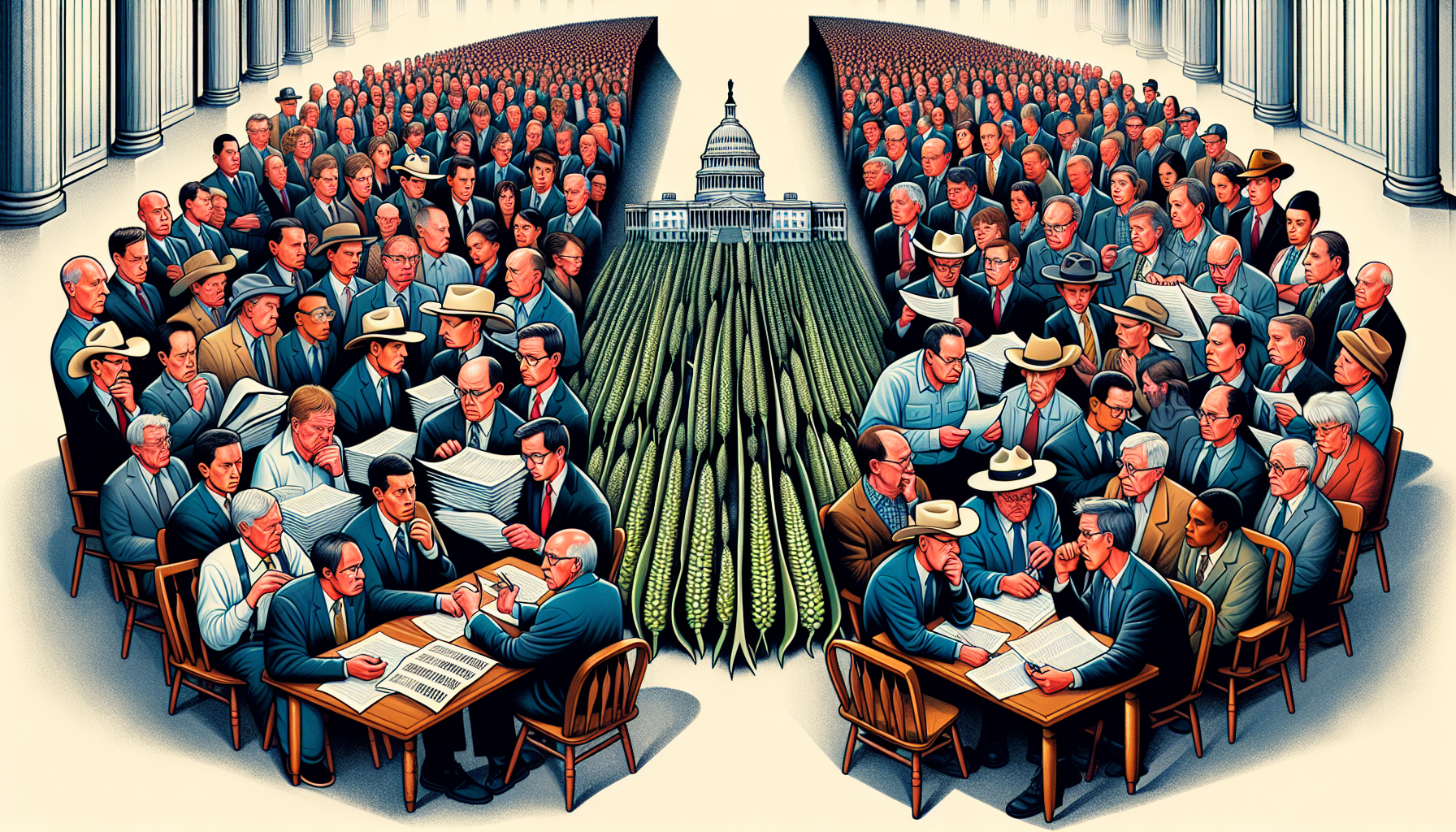A Comprehensive Guide to the 2024 Farm Bill Update
Table of Contents
- Introduction
- Overview of the 2024 Farm Bill
- Proposed Amendment on Hemp-Derived THC
- Impact on the Hemp Industry
- Opposition from Key Stakeholders
- Regulatory Recommendations
- Legislative Process and Next Steps
- Implications for Farmers and Ranchers
- Crop Insurance, Disaster Assistance, and Listening Sessions
- Conclusion
- Frequently Asked Questions (FAQs)
- Source Links
Introduction
Over the last 40 days the new 2024 hemp farm bill that has caused some ruckusl here in the US. It has brought a lot of speculations showing stricter regulations on hemp-derived THC products, sparking controversy in the industry. I'll share what this new bill means, key changes and their potential impact on hemp farmers and other farm businesses.
Our amazing journals and art decor prints are not just beatifully made, but also educational for all enthusiast. Science-backed journals designed for you to track every moment, growing, cooking, sex, pets, CBD, and all forms of cannabis. Explore our journals today!
Key Takeaways
-
The 2024 Farm Bill, known as the Farm, Food, and National Security Act of 2024, aims to invest $1.5 trillion over the next decade to support food security, national security, and the agricultural sector.
-
An amendment proposed by Rep. Mary Miller seeks to redefine hemp and ban ingestible hemp products containing any trace of THC, potentially disrupting the multibillion-dollar hemp-derived cannabinoid industry.
-
Key stakeholders, including the U.S. Hemp Roundtable and the Indigenous Cannabis Industry Association, oppose the proposed amendment, citing concerns over its impact on the hemp industry and the economic stability of Indigenous communities.
Overview of the 2024 Farm Bill
The 2024 Farm Bill emerges as a light tower for America’s agricultural future, serving as a comprehensive package addressing the all around needs of of todays modern-day industry. Officially titled the Farm, Food, and National Security Act of 2024, the new farm bill is a testament to the nation’s commitment to ensuring food security and improving national security in an always-evolving global landscape. This bill, signed into action with a purpose to make a substantial impact, its been meticulously crafted to meet the intricate demands of both the diligent farmers raising the land and the consumers relying on the fruits of their labor.
On May 17th Sennator GT Thompson from the U.S. House Committee of Agriculture, released a 942-page document outlining the bill’s provisions thats sparked widespread discussions accross the industry. At the heart of the discussion is the staggering projected expenditure of $1.5 trillion over the next decade, a figure that underscores the bill’s ambition and the government’s investment in the agricultural sector. More than a financial blueprint, this agriculture improvement act is a strategic endeavor aimed at sustaining the farm bill programs that are vital to rural America.
Continuing a legacy of legislation, the current farm bill strives to:
-
Boost the nation’s food sovereignty
-
Adapt to changing economic conditions and technological advancements
-
Carry the weight of expectation—expectations of enhanced support, innovation, and a steadfast resolve to nurture the land that feeds a nation.
Proposed Amendment on Hemp-Derived THC
Amiong the vast array of arrangements, an aggressive proposal stands out, one that could drastically alter the trajectory of the hemp industry. Illinois Rep. Mary Miller has put forth an amendment to the next farm bill that seeks to redefine hemp, effectively banning all ingestible hemp products containing any trace of THC. The ripple effect of such a change would extend far beyond the fields, potentially disrupting the multibillion-dollar hemp-derived cannabinoid industry that has flourished in the wake of the federal legalization of hemp.
This new legislation would cast a wide net, ensnaring products containing delta-8 THC and other novel cannabinoids under the umbrella of federal prohibition would not be considered legally defined as hemp. Interestingly, the U.S. Cannabis Council stands in support of Rep. Miller’s proposition, aligning with the view that stricter definitions may be necessary to navigate the complexities of a rapidly evolving market. However, this perspective is not without its detractors, as we will soon discover.
ALSO READ: When will weed be federally legal and what does the new descheduling mean?
Impact on the Hemp Industry

Should this amendment be implemented? Its ramifications would be profound and widespread. The hemp industry, currently estimated at a value of $28 billion, could see a significant portion of its cannabinoid market evaporate overnight. By altering the definition of hemp to encompass only naturally occurring, nonintoxicating (psychoactive) cannabinoids, the amendment aims to close perceived loopholes that have allowed the commercialization of cannabinoid derivatives. Consequently, the once-booming market for physchoactive hemp-derived cannabinoids such as delta-8 THC could be brought to a standstill.
Particularly hard hit would be seed companies, breeders, and cannabis flower producers, who have been navigating the complexities of interstate commerce. The proposed changes could severely limit their ability to sell seeds and cannabis flowers across state lines, putting a chokehold on an industry that thrives on innovation and diversity. The Indigenous Cannabis Industry Association (ICIA) has emphasized the potential upheaval within the fiber and grain market, highlighting the additional challenges Indigenous farmers may face in light of the amendment. Rob Pero, founder of ICIA, articulates the concern that the amendment could destabilize the market for non-psychoactive parts of the cannabis plant, affecting not only the cannabinoid sector but also the broader agricultural community.
Opposition from Key Stakeholders
Voices from framers who raise the fields, to the halls of government power, as key stakeholders rally to challenge the proposed amendment. The U.S. Hemp Roundtable, representing the collective interests of the hemp industry, has taken a firm stance against the language of the bill that could, in their view, spell the end of hemp farming as we know it. Their advocacy extends to urging Congress to reject the Farm Bill unless the combative provisions are removed.
Instead, House Agriculture Committee Chairman G.T. Thompson grouped it “en bloc” with several other amendments and subjected them to a voice vote, which passed. - US Hemp Roundtable
The Indigenous Cannabis Industry Association has added its voice to the chorus of opposition, citing grave concerns over the amendment’s potential to federally ban all ingestible hemp products containing THC. Rob Pero has warned that such a move could decimate up to 95% of the current hemp products market, thereby threatening the livelihoods and economic stability of Indigenous communities.
The U.S. Hemp Rountable Group says, "This amendment from Rep. Mary Miller (R-IL) would not only ban potentially impairing products like Delta-8, but it would bring under a new prohibition all non-intoxicating CBD products with any quantifiable amount of THC – meaning 90-95% of the hemp products market would be federally banned. Even animal feed – which has been approved by FDA for these uses – would be banned. Redefining hemp to include a calculation of THC-A would even wreak havoc in the fiber and grain market." This is a tangible threat that could reshape the landscape of the CBD products industry, hemp grain, and the lives of those who depend on it.
Regulatory Recommendations
In the debate, the National Cannabis Industry Association (NCIA) has put forth a series of regulatory recommendations to navigate the murky waters of THC hemp products. Their approach calls for a regulated environment akin to that which governs marijuana and alcohol—a system rooted in safety testing, labeling, and age restrictions. These proposed measures include capping the THC content per serving for finished hemp-derived products, aligning them with state dosage limits that typically range between 5-10 mg.
Furthermore, the NCIA advocates for an increase in the allowable THC limit in hemp crops from the current 0.3% to 1%, a move that would align U.S. standards with those of the international community. Emphasizing the importance of consumer safety, the NCIA insists on rigorous testing and accurate labeling to ensure that psychoactive hemp products do not fall into the hands of minors.
The NCIA believes that a delicate balancing act between safety, innovation, and consumer access is essential for the future of cannabinoid regulation.
Legislative Process and Next Steps

The 2024 Farm Bill and its amendments still have a long journey ahead. As the bill proceeds to the House floor for debate, the uncertainty of its fate looms large in a Congress divided by bipartisan tensions, particularly in an election year. The House Committee on Agriculture, under Chairman Glenn “GT” Thompson, has already presented an overview of the bipartisan policies encompassed within the bill, signaling a commitment to collaborative policymaking.
The markup of the bill is scheduled for May 23, which will be a critical juncture in determining the legislative path forward.
It is worth noting that the Farm Bill is a cyclical piece of legislation, with the last iteration, the 2018 Farm Bill, extended by President Biden to allow for the continuation of authorized programs through September 30, 2024. This extension serves as a bridge, providing a temporary safety net for various agriculture improvement act provisions as lawmakers grapple with the complexities of the new legislation.
Implications for Farmers and Ranchers
The forthcoming Farm Bill surrounds a range of provisions aiming to support and secure the future of America’s farmers and ranchers. As the farm bill continues to develop, at its core, the bill seeks to enhance the agricultural safety net, offering specialty crop producers expanded options to protect their living against the behavior of nature and market forces. With the introduction of new farm bills, the government aims to further strengthen the agricultural sector by expanding their support in the industry
These efforts are complemented by increased funding for programs aimed at assisting socially disadvantaged groups in rural communities, ensuring equitable access to land, farming resources, and natural resources through the implementation of a rural development title.
ALSO READ: The Impact of Cannabis Legalization on Culture
With its allocation of over $6 billion annually, the Farm Bill showcases its commitment to conservation and rural development, providing essential funding to help farmers and ranchers adapt to climate change and conserve their land. Conservation programs such as the Environmental Quality Incentives Program (EQIP) and the Agricultural Conservation Easement Program (ACEP) play a pivotal role in promoting sustainable practices, improving water quality, and protecting wildlife habitats.
Crop Insurance, Disaster Assistance, and Listening Sessions
The 2024 Farm Bill’s crop insurance title reflects growth and improvement, continuing the trajectory set by the 2018 Farm Bill extension. This vital safety net has been made more accessible, with a particular emphasis on affordability for veteran farmers.
The bill also strives to bolster disaster assistance programs, providing a lifeline to agricultural producers facing the devastation wrought by natural disasters.
As an integral component of the Farm Bill’s development, "Listening Sessions" will help serve as a platform for the USDA to engage with the agricultural community, solicit feedback, and address concerns. These sessions are not only a conduit for communication but also a reflection of the federal government’s commitment to considering the viewpoints of farmers, stakeholders, and Tribal Nation officials.
Conclusion
As we reach the end of our exploration of the 2024 Farm Bill, it’s clear that this sweeping legislation holds the keys to the kingdom that is American agriculture—a kingdom with challenges and opportunities. From the controversial amendments regarding hemp-derived THC to the progressive strides in conservation and disaster assistance, the Farm Bill is a giant tapestry woven from the threads of policy, advocacy, and the collective aspirations of the nation’s agriculture community. It is a bill that will undoubtedly shape the agricultural landscape for the next generation, fostering resilience, innovation, and sustainability. God speed.
Frequently Asked Questions (FAQs)
What are the main objectives of the 2024 Farm Bill?
The main objectives of the 2024 Farm Bill include addressing the needs of modern-day farmers and consumers and providing food security and national security, with a projected cost of $1.5 trillion over 10 years.
How does the proposed amendment on hemp-derived THC affect the industry?
The proposed amendment on hemp-derived THC could potentially have a significant impact on the industry by redefining hemp to exclude all ingestible products containing any level of THC, which may affect a substantial portion of the cannabinoid hemp market.
What is the stance of key stakeholders on the amendment to the 2024 Farm Bill?
Major stakeholders such as the U.S. Hemp Roundtable and the Indigenous Cannabis Industry Association are against the amendment, concerned about its potential impact on hemp farming and the economic well-being of Indigenous communities.
What recommendations have been made regarding the regulation of psychoactive hemp products?
The National Cannabis Industry Association recommends regulating psychoactive THC hemp products similarly to marijuana and alcohol, including increasing the allowable THC limit in hemp while enforcing safety testing and labeling.
When will Congress discuss and decide on the 2024 Farm Bill and its amendments?
Congress will likely discuss the 2024 Farm Bill on May 23, but its passage is uncertain due to division within Congress and the upcoming election year.
Source Links:
https://hempsupporter.com/news/urgent-hemp-killing-amendment-filed-for-farm-bill-contact-your-member-of-congress-today-to-defeat-it/
https://thecannabisindustry.org/update-from-d-c-the-latest-on-marijuana-rescheduling-and-the-farm-bill/
https://www.uscc.org/
https://files.constantcontact.com/48922045201/c026038f-33db-4360-b430-2562ac1b0e7f.pdfhttps://hempsupporter.com/wp-content/uploads/2024/05/MaryMillerAmendment-VOTENO.pdf
https://norml.org/news/2024/05/30/federal-house-committee-approves-amendment-barring-production-of-hemp-derived-intoxicating-products/
https://www.congress.gov/bill/118th-congress/house-bill/3755
https://www.indigenouscannabis.org/
https://www.cannabisbusinesstimes.com/news/farm-bill-2024-amendment-definition-hemp-derived-cannabiniod-thca-delta-8/
https://agriculture.house.gov/news/documentsingle.aspx?DocumentID=7780
https://www.house.gov/committees





